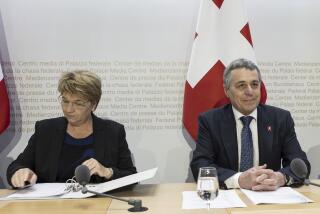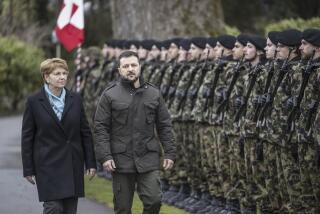Soviets to Stress Arms Progress in Vienna Talks
MOSCOW â The Soviet Union wants to take advantage of an international conference in Vienna next week to make progress on an arms control accord with the United States, a government spokesman said Thursday.
Secretary of State George P. Shultz and Soviet Foreign Minister Eduard A. Shevardnadze are expected to continue in Vienna the nuclear disarmament talks that were broken off at the summit conference in Iceland. Gennady I. Gerasimov, a spokesman for the Soviet Foreign Ministry, told reporters, âWe donât come to this meeting with empty hands.â
The Vienna conference, which is to open Nov. 4, has been called to review compliance with the 1975 Helsinki accords on European security and cooperation, but Gerasimov said, âI think we should be interested in the main point--the fate of nuclear disarmament.â
The Shevardnadze-Shultz talks will come on the heels of three weeks of sometimes bitter recrimination over whether President Reagan or Soviet leader Mikhail S. Gorbachev is to blame for the failure to reach an accord Oct. 11-12 in Reykjavik, the Iceland capital.
Never So Close
Both sides agree that the arms reduction positions of Washington and Moscow have never been so close as they were in Iceland, where Gorbachev offered in a bold and surprising move to reduce the numbers of missiles of all kinds and Reagan approved.
The talks collapsed over their differences over whether strict limits should be established on the testing of technology related to Reaganâs Strategic Defense Initiative, the so-called âStar Warsâ space-based missile defense program.
Since then, Moscow has insisted that Reagan agreed with Gorbachev to ban all nuclear weapons after a 10-year period. The White House at first said that the President had accepted that position, then later said he wanted to eliminate only ballistic missiles, preserving the American advantage in nuclear bombers and air-launched cruise missiles. Then on Tuesday, the White House announced that the Soviet characterization of the talks was essentially correct, in that Reagan told Gorbachev âthat elimination of all nuclear weapons had always been his goal.â
But American officials are still stressing that the Reykjavik discussions never reached the stage of an agreement to eliminate all nuclear weapons.
Emphasis on Continuity
Gerasimov, in a briefing earlier this week, put the emphasis on continuity rather than discord, saying: âReykjavik brought to life a lot of hopes, and if we stop now, if we fold our hands, we could lose momentum. If the Vienna forum did not exist, we would have to invent it.â
But Soviet insistence on an all-or-nothing agreement, including limits on Reaganâs Strategic Defense Initiative, appears to limit the prospects for progress at Vienna. So far, Gorbachev has ruled out any formal accord on eliminating medium-range missiles from Europe until agreements are achieved on strategic arms and the âStar Warsâ program as well. But the United States has said the Soviet position may be more flexible than that.
In addition, several West European states have cautioned the United States that total withdrawal of American missiles from Europe would leave the area vulnerable to the Soviet Unionâs superior conventional forces.
Moscow has been pushing another proposal--for substantial reductions in ground forces on both sides--and it seems likely that this plan will be advanced in Vienna. But Shultz and Shevardnadze, who may meet formally as early as next Tuesday at the opening ceremonies of the Vienna conference, are expected to focus on nuclear arms.
Some Soviet commentators have implied strongly that there is no point in trying to reach an accord with the United States so long as Reagan is President. But Gerasimov has said that these people were not speaking for the Soviet government.
More to Read
Sign up for Essential California
The most important California stories and recommendations in your inbox every morning.
You may occasionally receive promotional content from the Los Angeles Times.










